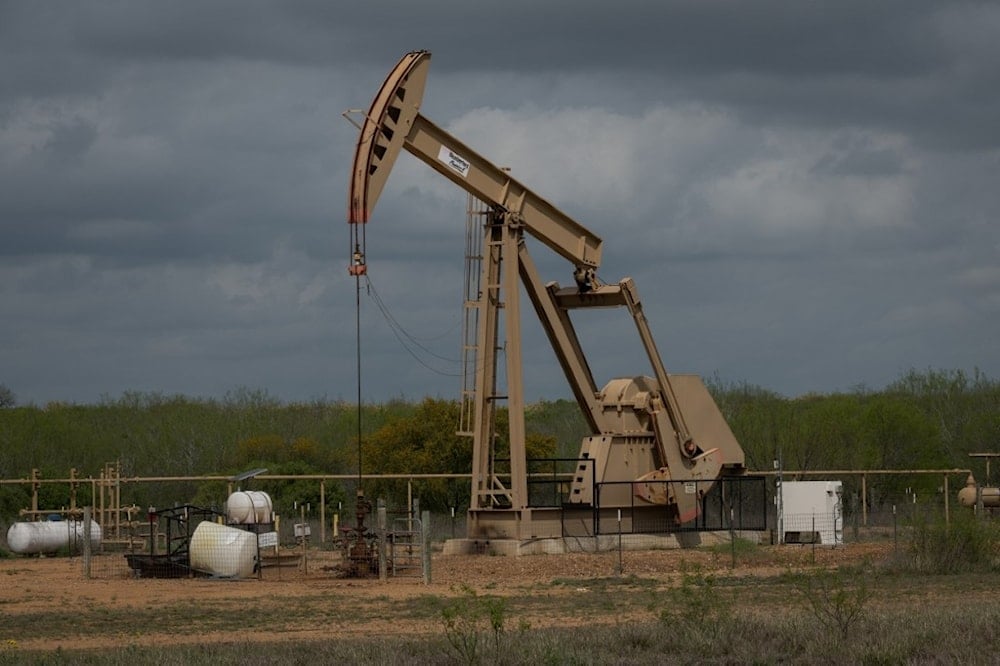US frackers, Saudis to Trump: No more shale oil drilling – WSJ
Saudi Arabia’s approach to Iran has evolved from opposing the 2018 nuclear deal to favoring diplomatic engagement, signaling a shift in regional policy and priorities.
-

In this file photo taken on March 12, 2019, a pump jack at an oil extraction site is pictured in Cotulla, Texas. (AFP)
President Donald Trump is advocating for increased oil production, but US shale producers and Saudi Arabia are pushing back, The Wall Street Journal reported.
For months, Trump has urged US frackers to "drill, baby, drill," but industry leaders told WSJ that another oil boom isn’t likely anytime soon. Many companies, having previously over-drilled themselves into bankruptcy, are now focused on cost control and investor returns.
Trump’s advisors acknowledge that shale producers won’t significantly boost output in the short term, WSJ reported, citing sources familiar with the matter. Instead, they see OPEC—led by Saudi Arabia—as the best avenue to increase oil supply and lower prices.
Saudi Arabia refuses to boost global supply
However, Saudi officials have communicated to former US officials that they are unwilling to increase production. Some of these officials have shared that message with Trump’s team, as per the report.
Trump believes that a surge in oil supply would ease inflation, pave the way for interest rate cuts, and strengthen his position against Russia and Iran. In a January speech, he said he planned to ask OPEC members, including Saudi Arabia, to lower oil prices. His expected visit to the kingdom early in his second term will likely focus on securing an oil production increase.
Trump’s emphasis on oil prices has left some industry insiders puzzled. Currently, oil is around $73 per barrel—far lower than the 2022 average of over $94, when gasoline peaked above $5 per gallon. Gasoline prices now hover around $3.10. Still, Trump has declared a national "energy emergency" and promised to cut energy costs in half.
Targeting Russia, Iran with oil prices
Keith Kellogg, Trump’s special envoy to Ukraine and Russia, has suggested that global producers should push oil prices down to $45 per barrel to pressure Russia into ending the war in Ukraine.
However, such a drop would be devastating for US frackers and Saudi Arabia—two of Trump’s most crucial allies in the oil market. The last time oil prices fell below $45, during the 2020 pandemic, triggered a price war between Saudi Arabia and Russia and led to multiple bankruptcies in the US shale industry.
Saudi Arabia also has a budgetary concern. The International Monetary Fund estimates that the kingdom needs oil prices of around $90 per barrel to fund social programs, citizen stipends, and infrastructure projects. As one former US official said, as quoted by WSJ, "There is a clash coming between Trump and Saudi Arabia over oil prices."
Frackers prioritizing stability over growth
Trump’s advisors have privately told oil and gas donors that they recognize the president cannot rely on US frackers for a rapid production increase.
"Companies are no longer pursuing growth at all costs," said Kaes Van’t Hof, president of West Texas oil producer Diamondback Energy. "Shale is in a much different phase of its life cycle."
In the long run, Trump’s pro-oil policies—such as rolling back environmental regulations—could attract more investment into the industry, his advisors believe. They argue that more capital would eventually lead to higher production. Additionally, easing restrictions on pipelines and other infrastructure could stimulate fossil fuel demand, potentially encouraging more drilling.
However, experts caution that any increase in US production will take time. Ed Crooks, vice chairman for the Americas at energy consulting firm Wood Mackenzie, said, as quoted by WSJ, "We don’t see anything that will make a colossal difference to the economics of production."
US oil output unlikely to meet Trump’s demands
US oil production is already at record levels, and executives expect only modest growth unless prices surge. The Energy Department forecasts a 2% increase in domestic output, reaching 13.7 million barrels per day by December, with production remaining relatively flat in 2026.
This level of growth would not meet Trump’s immediate demand for more oil. It could also complicate his ability to impose strict sanctions on Russia and Iran, as reducing their oil exports would tighten supply and drive prices higher—undermining his promise to lower energy costs for Americans.
Saudi Arabia wary of another oversupply crisis
Before his inauguration, Trump’s transition team indicated that he planned to visit Saudi Arabia to secure a commitment that the kingdom would fill any supply gaps if he escalated pressure on Iran. His team estimated that new sanctions could cut Iran’s exports by 500,000 to 750,000 barrels per day. Proposed measures include targeting Chinese ports that import Iranian oil and restricting Iraq’s oil dealings with Tehran.
Yet, Saudi Arabia appears reluctant. Two former US officials said, as quoted by WSJ, that the kingdom is wary of repeating the 2019 oil oversupply crisis. That year, after the Trump administration encouraged Saudi Arabia to prepare for an Iran oil embargo, the US unexpectedly granted exemptions to some buyers in Asia—leading to a glut and lower prices.
Another factor influencing Saudi Arabia’s decision is its strategic partnership with Russia through OPEC+, which helps maintain price stability.
Additionally, Riyadh’s stance toward Iran has shifted. Unlike in 2018—when Saudi Arabia opposed the Iran nuclear deal and supported sanctions—the kingdom now prefers diplomatic engagement. Saudi officials say they would rather participate in nuclear negotiations than work against them.
As Trump prepares to push for lower oil prices, both US frackers and Saudi Arabia seem unwilling to comply. With domestic production unlikely to surge and Saudi Arabia resisting pressure, Trump may find it challenging to achieve his goal of a fresh oil boom.

 6 Min Read
6 Min Read








